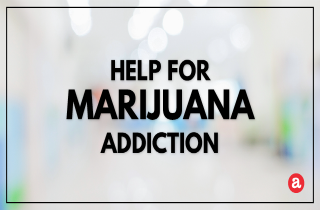Marijuana addiction help
THC is the active ingredient found in marijuana. It is known to heighten the natural process of the endocannabinoid system, which is an important modulator of the autonomic nervous system. However, long term use of the cannabis plant can lead to both physical and psychological dependence on marijuana. Despite popular belief, you can experience marijuana withdrawal symptoms upon cessation of use. To summarize: marijuana can be addictive.
What are the different treatment options for marijuana addiction and where can you go for marijuana addiction help? We review here and invite your questions about marijuana addiction at the end of the article.
How to help marijuana addiction
There are three main phases of marijuana addiction treatment. These include detoxification, physical and psychological treatment of marijuana addiction. We discuss each of these phases of treatment below.
1. Marijuana withdrawal treatment
The first phase of help for marijuana addiction is the withdrawal and detoxification phase. During withdrawal, the body gets rid of the toxins accumulated from years of abuse. Compared with heroin and severe alcohol withdrawal syndromes, marijuana withdrawal syndromes pose no major medical and psychiatric effects. HOwever, people abstaining from marijuana usually experience anger, depression, restlessness and change in appetite. These symptoms usually start within 24 to 48 hours of abstinence and within four to six days. Acute marijuana withdrawal lasts from one to three weeks. While traditional detox is usually not necessary during marijuana withdrawal, sometimes anti-anxiety or anti-depressant medications may be prescribed.
2. Physical stabilization and treatment of marijuana PAWS
PAWS, or post-acute withdrawal symptoms, for marijuana include longer-term emotional and psychological withdrawal symptoms. PAWS occurs as the brain chemistry starts to improve and return to homeostasis without the prescence of THC. Signs that the brain is recovering can include increased mood swings, irritability, low enthusiasm and variable energy. To stabilize episodes of PAWs, it is important to set realistic goals. Think of what you can do right now to improve your situation. You can also seek help from an expert. There are health care providers such as psychologists or psychiatrists who specialize in diagnosing and treating marijuana PAWS.
3. Psychological marijuana addiction treatment
Recognizing and managing psycho-emotional thoughts are important elements of a marijuana addiction treatment plan. Psychological interventions can motivate you to change. Studies show that behavioral treatments such as motivational enhancement therapy (MET), cognitive-behavioral therapy (CBT) and contingency management (CM) show promising results in the management of this kind of addiction.
Getting help for marijuana addiction
Overcoming any kind of addiction is not easy. Treatment for marijuana addiction begins by recognizing that there is a problem and that you need someone who can help you. Who do you call for help?
1. Family and Friends – The support you can get from family and friends can help you on your way to recovery. Your family and friends want the best for you and they can help you find a professional who can help you with cannabis dependency problem.
2. Licensed clinical social workers – LCSWs are adept at helping people with marijuana addiction locate and get enrolled in treatment services. Social workers can also connect you with local support services or individuals who can help you,
3. Marijuana addiction treatment centers – Nationwide, you can findtreatment centers that focus on treating cannabis dependency. Their approach to substance abuse is clinically proven to be effective in overcoming addiction.
4. Marijuana Anonymous – MA is a peer support group created for those who struggle with marijuana addiction. Members of MA share experience, strength, and hope with each other to help others recover from cannabis dependency. To become a member of this group, you need to have a desire to stop using marijuana.
5. Your family doctor – Another good place to start to get help for marijuana addiction. Family doctors can refer you to more specialized services for addiction treatment in your area, and/or local resources.
6. Therapists – Health care providers such as licensed psychotherapists or psychiatrists specialize in treating marijuana addiction are skilled in creating action plans to help you cope with stress and avoid relapse. They can also refer you to a detox clinic or support groups necessary for your recovery.
How to help a marijuana addict
Enabling a family member with a marijuana abuse problem is a common barrier to treatment. Family members have a tendency to enable their loved ones, allowing them to delay treatment. Emotions can block objective thinking, which prevents families from finding a solution to the addiction problem.
Professional help is needed to treat not just the addict, but also assist family and friends to take addiction seriously. If you know someone suffering from marijuana addiction, here’s what you can do to help:
- Get information about marijuana addiction from medical professionals and other reliable resources.
- Find support groups and organizations that offer programs for families and friends of marijuana users.
- Seek professional psychologists, psychiatrists, or social workers in your area that specializes in marijuana addiction.
- Recognize that there is a problem and seek family counseling.
Marijuana addiction help and helplines
Help for marijuana addiction is just a phone call away. For more information about cannabis addiction, call the following helplines:
Marijuana Anonymous 1-800-766-6779 – They offer support to people struggling from marijuana. Their twelve step program is proven to put marijuana behind you and get hold of your life.
SAMHSA Treatment Referral Helpline (1-800-662-HELP)— This is offered by the Substance Abuse and Mental Health Services Administration. They refer callers to treatment facilities, support groups, and other local organizations that can provide help for their specific need.
Help with marijuana addiction questions
Still have questions about marijuana addiction? Maybe you want to share your experiences? Feel free to share your questions and experiences about the topic and we will respond to you as soon as possible.









Related Posts